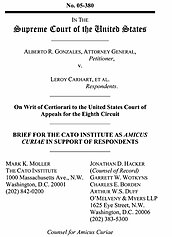Gonzales v. Carhart
Learn more about Cato’s Amicus Briefs Program.
In Stenberg v. Carhart, the Supreme Court struck down a Nebraska law banning partial-birth abortions because the Nebraska statute lacked an exception in cases where a partial-birth abortion is necessary to the mother’s health. Just three years later, Congress passed the Partial-Birth Abortion Ban Act, a law nearly identical to the Nebraska ban. Congress attempted to skirt the Supreme Court’s holding in Stenberg by advancing its own factual findings that a health exception is medically unnecessary, based on a legislative determination that partial-birth abortions are never the safest method for performing an abortion. Cato’s brief argues that the Supreme Court should not defer to congressional findings of fact because Congress cannot claim any special expertise regarding the regulation of medical judgment, an area that, by tradition and constitutional structure, is left largely to the province of the states. Indeed, if any legislative body deserves deference concerning the need for a health exception, it is state legislatures. By inviting deference to its fact-finding, Congress effectively invites the Court to make an end-run around the principles of separation of powers and federalism.

This work is licensed under a Creative Commons Attribution-NonCommercial-ShareAlike 4.0 International License.

